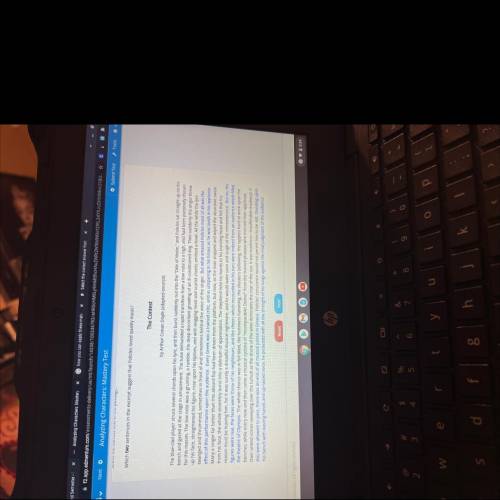The Contest
by Arthur Conan Doyle (adapted excerpt)
The blue-clad player struck several chor...

English, 21.01.2022 14:00, stinematesa
The Contest
by Arthur Conan Doyle (adapted excerpt)
The blue-clad player struck several chords upon his lyre, and then burst suddenly out into the "Ode of Nlobe," and Policles sat straight up on his
bench and gazed at the stage in amazement. The tune demanded a rapid transition from a low note to a high, and had been purposely chosen
for this reason. The low note was a grunting, a rumble, the deep discordant growling of an ill-conditioned dog. Then suddenly the singer threw
up his face, straightened his figure, rose upon his tiptoes, and with wagging head and scarlet cheeks emitted a howl. All the while the lyre
twanged and thrummed, sometimes in front of and sometimes behind the voice of the singer. But what amazed Policies most of all was the
effect of this performance upon the audience. Every Greek was a trained critic, and as unsparing in his hisses as he was lavish in his applause.
Many a singer far better than this absurd fop had been driven from the platform, but now, as the man stopped and wiped the abundant sweat
from his face, the whole assembly burst into a delirium of appreciation. The shepherd held his hands to his bursting head and felt that his
reason must be leaving him, for it was surely a dreadful musical nightmare, and he would wake soon and laugh at the remembrance. But no, the
figures were real, the faces were those of his neighbours, and the cheers which resounded in his ears were indeed from an audience which filled
the theatre of Olympia. The whole chorus was in full blast, the hummers humming, the shouters bellowing, the tappers hard at work upon the
benches, while every now and then came a musical cyclone of "Incomparable! Divinel" from the trained phalanx who Intoned their applause,
their united voices sweeping over the tumult as the drone of the wind dominates the roar of the sea. It was madness-Insufferable madness! If
this were allowed to pass, there was an end of all musical justice in Greece. Policles' conscience would not permit him to be still
. Standing upon
his bench with waving hands and up-raised voice, he protested with all the strength of his lungs against the mad Judgment of the audience.


Answers: 1
Other questions on the subject: English



English, 22.06.2019 03:30, aliviafrancois2000
In just over one hundred years, between 1701 and 1810, 252,500 enslaved africans were brought to barbados—an island that occupies only 166 square miles (making it, today, one of the smallest countries in the world). the english then set out to conquer more sugar islands, starting with jamaica, which they took from spain in 1655. in the same period that the 252,500 africans were brought to barbados, 662,400 africans were taken to jamaica. thus, sugar drove more than 900,000 people into slavery, across the atlantic, to barbados and jamaica—and these were just two of the sugar islands. the english were eagerly filling antigua, nevis, saint kitts, and montserrat with slaves and sugar mills. they took over much of dutch guiana for the same reason. seeing the fortunes being made in sugar, the french started their own scramble to turn the half of the island of hispaniola that they controlled (which is now haiti), as well as martinique, guadeloupe, and french guiana (along the south american coast near dutch guiana), into their own sugar colonies, which were filled with hundreds of thousands more african slaves. by 1753, british ships were taking average of 34,250 slaves from africa every year, and by 1768, that number had reached 53,100. –sugar changed the world, marc aronson and marina budhos how do the authors use historical evidence to support their claim? x(a) they use secondary sources to show how french and english monarchs were indifferent to enslaved people. x(b)they use secondary sources to show that enslaved people often fought for their freedom after arriving in the caribbean. the answer is: (c)they use facts from primary sources to show how countries increased the number of enslaved people to produce more sugar. x(d)they use primary source interviews to show that countries could make more money in trading sugar without using enslaved people.
Answers: 1

English, 22.06.2019 04:30, oliviacalhoun29
What was the biggest type of pirate ship called?
Answers: 1
Do you know the correct answer?
Questions in other subjects:






English, 30.05.2020 21:04









